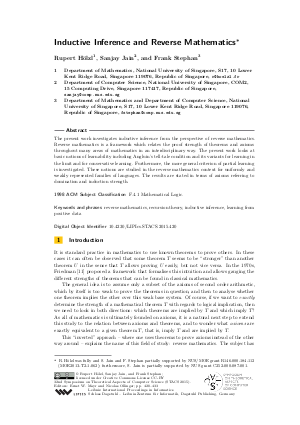Inductive Inference and Reverse Mathematics
Authors Rupert Hölzl, Sanjay Jain, Frank Stephan
-
Part of:
Volume:
32nd International Symposium on Theoretical Aspects of Computer Science (STACS 2015)
Part of: Series: Leibniz International Proceedings in Informatics (LIPIcs)
Part of: Conference: Symposium on Theoretical Aspects of Computer Science (STACS) - License:
 Creative Commons Attribution 3.0 Unported license
Creative Commons Attribution 3.0 Unported license
- Publication Date: 2015-02-26
File

PDF
LIPIcs.STACS.2015.420.pdf
- Filesize: 0.56 MB
- 14 pages
Document Identifiers
Subject Classification
Keywords
- reverse mathematics
- recursion theory
- inductive inference
- learning from positive data
Metrics
- Access Statistics
-
Total Accesses (updated on a weekly basis)
0PDF Downloads0Metadata Views
Abstract
The present work investigates inductive inference from the perspective of reverse mathematics. Reverse mathematics is a framework which relates the proof strength of theorems and axioms throughout many areas of mathematics in an interdisciplinary way. The present work looks at basic notions of learnability including Angluin's tell-tale condition and its variants for learning in the limit and for conservative learning. Furthermore, the more general criterion of partial learning is investigated. These notions are studied in the reverse mathematics context for uniformly and weakly represented families of languages. The results are stated in terms of axioms referring to domination and induction strength.
Cite As Get BibTex
Rupert Hölzl, Sanjay Jain, and Frank Stephan. Inductive Inference and Reverse Mathematics. In 32nd International Symposium on Theoretical Aspects of Computer Science (STACS 2015). Leibniz International Proceedings in Informatics (LIPIcs), Volume 30, pp. 420-433, Schloss Dagstuhl – Leibniz-Zentrum für Informatik (2015)
https://doi.org/10.4230/LIPIcs.STACS.2015.420
BibTex
@InProceedings{holzl_et_al:LIPIcs.STACS.2015.420,
author = {H\"{o}lzl, Rupert and Jain, Sanjay and Stephan, Frank},
title = {{Inductive Inference and Reverse Mathematics}},
booktitle = {32nd International Symposium on Theoretical Aspects of Computer Science (STACS 2015)},
pages = {420--433},
series = {Leibniz International Proceedings in Informatics (LIPIcs)},
ISBN = {978-3-939897-78-1},
ISSN = {1868-8969},
year = {2015},
volume = {30},
editor = {Mayr, Ernst W. and Ollinger, Nicolas},
publisher = {Schloss Dagstuhl -- Leibniz-Zentrum f{\"u}r Informatik},
address = {Dagstuhl, Germany},
URL = {https://drops.dagstuhl.de/entities/document/10.4230/LIPIcs.STACS.2015.420},
URN = {urn:nbn:de:0030-drops-49324},
doi = {10.4230/LIPIcs.STACS.2015.420},
annote = {Keywords: reverse mathematics, recursion theory, inductive inference, learning from positive data}
}
Author Details
References
-
Lenny Adleman and Manuel Blum. Inductive inference and unsolvability. The Journal of Symbolic Logic, 56:891-900, 1991.

-
Dana Angluin. Inductive inference of formal languages from positive data. Information and Control, 45:117-135, 1980.

-
Lenore Blum and Manuel Blum. Towards a mathematical theory of inductive inference. Information and Control, 28:125-155, 1975.

-
Matthew de Brecht, Masanori Kobayashi, Hiroo Tokunaga, and Akihiro Yamamoto. Inferability of closed set systems from positive data. In New Frontiers in Artificial Intelligence, JSAI 2006. Conference and Workshops, Tokyo, Japan, 5-9 June 2006, Revised Selected Papers, volume 4384 of Lecture Notes in Computer Science, pages 265-275. Springer, 2007.

-
Matthew de Brecht and Akihiro Yamamoto. Mind change complexity of inferring unbounded unions of restricted pattern languages from positive data. Theoretical Computer Science, 411(7-9):976-985, 2010.

-
Matthew de Brecht and Akihiro Yamamoto. Topological properties of concept spaces (full version). Information and Computation, 208(4):327-340, 2010.

-
John Case and Chris Lynes. Machine inductive inference and language identification. In Proceedings of the Nineth International Colloquium on Automata, Languages and Programming, volume 140 of Lecture Notes in Computer Science, pages 107-115. Springer, 1982.

-
Chi Tat Chong, Theodore A. Slaman, and Yue Yang. Π¹₁-conservation of combinatorial principles weaker than Ramsey’s theorem for pairs. Advances in Mathematics, 230(3):1060-1077, 2012.

-
Chi Tat Chong, Theodore A. Slaman, and Yue Yang. The metamathematics of stable Ramsey’s theorem for pairs. The Journal of the American Mathematical Society, 27:863-892, 2014.

-
Damir D. Dzhafarov and Carl Mummert. On the strength of the finite intersection principle. Israel Journal of Mathematics, 196:345-361, 2013.

-
Harvey Friedman. Some systems of second order arithmetic and their use. In Proceedings of the International Congress of Mathematicians, Vancouver, 1974, volume 1, pages 235-242, 1974.

-
E. Mark Gold. Language identification in the limit. Information and Control, 10:447-474, 1967.

-
Susumu Hayashi. Mathematics based on incremental learning - excluded middle and inductive inference. Theoretical Computer Science, 350:125-139, 2006.

-
Dennis Hirschfeldt. Slicing the Truth. On the Computable and Reverse Mathematics of Combinatorial Principles, volume 28 of Lecture Notes Series, Institute for Mathematical Sciences, National University of Singapore. World Scientific, 2014.

-
Sanjay Jain, Daniel Osherson, James Royer, and Arun Sharma. Systems That Learn: An Introduction to Learning Theory, Second Edition. The MIT Press, Cambridge, Massachusetts, 1999.

-
Satoshi Kobayashi. Approximate identification, finite elasticity and lattice structure of hypothesis space. Technical Report CSIM 96-04, Department of Computer Science and Information Mathematics, University of Electro-Communications, 1996.

-
Daniel Osherson, Michael Stob, and Scott Weinstein. Systems That Learn, An Introduction to Learning Theory for Cognitive and Computer Scientists. The MIT Press, Cambridge, Massachusetts, 1986.

-
Dilip Raghavan, Frank Stephan, and Jing Zhang. Weakly represented families in reverse mathematics. Manuscript, 2014.

-
Stephen G. Simpson. Subsystems of Second Order Arithmetic. Cambridge University Press, 2009.

-
Keith Wright. Identification of unions of languages drawn from an identifiable class. In Proceedings of the Second Annual Workshop on Computational Learning Theory, pages 328-333. Morgan Kaufmann, 1989.

-
Thomas Zeugmann, Steffen Lange, and Shyam Kapur. Characterizations of monotonic and dual monotonic language learning. Information and Computation, 120(2):155-173, 1995.

